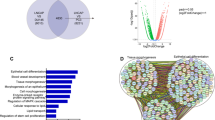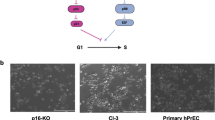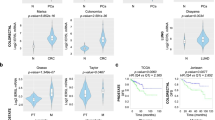Abstract
Aim:
Interleukin-6 (IL-6) is a pleiotropic cytokine that is associated with tumor metastasis and prostate cancer. We evaluated the mechanism and effect of 17-(allylamino)-17-demethoxygeldanamycin (17AAG), a novel inhibitor of heat shock protein 90 (Hsp90), on the IL-6 gene expression in human prostatic carcinoma (PC-3) cells.
Methods:
Quantitative IL-6 and IL-6 receptor (IL-6R) expressions were assessed using RT-PCR. The deregulation of 17AAG and phor-bol 12-myristate 13-acetate (PMA) on the IL-6 gene was determined by ELISA and transient gene expression assays using an IL-6 reporter vector.
Results:
Although the IL-6R is ubiquitously expressed by prostatic epithelium cells, the IL-6 expression is only found in advanced prostatic carcinoma cells, such as PC-3 and DU145. Further studies using RT-PCR indicated that 17AAG downregulated the gene expression of IL-6. ELISA and the transient gene expression assay revealed that 17AAG blocked the stimulation of PMA of IL-6 gene expression in PC-3 cells. The PMA-induced IL-6 gene expression is dependent on the NF-κB response element. However, the effect of 17AAG appears to be mediated via a region located at -149 to +8 bp upstream of the transcriptional starting site of the IL-6 gene, and might not be through the NF-κB signaling pathway.
Conclusion:
The present study reveals that IL-6 is transcriptionally downregulated in human prostatic carcinoma cells in response to 17AAG. This result suggests the presence of a novel Hsp90 mediation pathway that is involved in the deregulation on the transcription of the human IL-6 gene in human prostate cancer.
Similar content being viewed by others
Log in or create a free account to read this content
Gain free access to this article, as well as selected content from this journal and more on nature.com
or
References
Royuela M, Ricote M, Parsons MS, Garcia-Tunon I, Paniagua R, De Miguel MR Immunohistochemical analysis of the IL-6 family of cytokines and their receptor in benign, hyperplasic and malignant human prostate. J Pathol 2004; 202: 41–9.
Palmer J, Hertzog PJ, Hammacher A . Differential expression and effects of gpl30 cytokines and receptors in prostate cancer cells. Int J Biochem Cell Biol 2004; 36: 2258–69.
Edwards J, Bartlett JMS . The androgen receptor and signal-transduction pathways in hormone-refractory prostate cancer. Part 2: androgen-receptor cofactors and bypass pathways. BJU Int 2005; 95: 1327–35.
Pfitzenmaier J, Vessella R, Higano CS, Noteboom JL, Wallace D Jr, Corey E . Elevation of cytokine levels in cachectic patients with prostate carcinoma. Cancer 2003; 97: 1211–6.
George DJ, Halabi S, Shepard TF, Sanford B, Vogelzang NJ, Small EJ, et al. The prognostic significance of plasma interleukin-6 levels in patients with metastatic hormone-refractory prostate cancer: results from cancer and leukemia group B 9480. Clin Cancer Res 2005; 11: 1815–20.
Jia L, Choong CS, Ricciardelli C, Kim J, Tilley WD, Coetzee GA . Androgen receptor signaling: mechanism of interleukin-6 inhibition. Cancer Res 2004; 64: 2619–26.
Culig Z, Steiner H, Bartsch G, Hobisch A . Interleukin-6 regulation of prostate cancer cells growth. J Cell Biochem 2005; 95: 497–505.
Ritossa F . Discovery of the heat shock response. Cell Stress Chaperones 1996; 1: 97–8.
Cullinan SB, Whitesell L . Heat shock protein 90: a unique chemo-therapeutic target. Semin Oncol 2006; 33: 457–65.
Lattouf JB, Srinivasan R, Pinto PA, Linehan WM, Neckers L . Mechanisms of disease: the role of heat-shock protein 90 in genitourinary malignancy. Nat Clin Pract Urol 2006; 3: 590–600.
Solit DB, Scher H, Rosen N . Hsp90 as a therapeutic target in prostate cancer. Semin Oncol 2003; 30: 709–16.
Ripley BJM, Isenberg DA, Latchman DS . Elevated levels of the 90 kDa heat shock protein (hsp90) in SLE correlate with levels of IL-6 and autoantibodies to hsp90. J Autoimmun 2001; 17: 341–6.
Cardillo MR, Ippoliti F . IL-6, IL-10 and HSP90 expression in tissue microarrays from human prostate cancer assessed by computer-assisted image analysis. Anticancer Res 2006; 26: 3409–16.
Tsui KH, Hsieh WC, Lin MH, Chang PL, Juang HH . Triiodothyronine modulates cell proliferation of human prostatic carcinoma cells by downregulation of the B-cell translocation gene 2. Prostate 2008; 68: 610–9.
Tsui KH, Chang PL, Juang HH . Manganese antagonizes iron blocking mitochondrial acontiase expresson in human prostate carcinoma cells. Asian JAndrol 2006; 8: 307–16.
Steiner H, Godoy-Tundidor S, Rogatsch H, Berger AP, Fuchs D, Comuzzi B, et al. Accelerated in vivo growth of prostate tumors that up-regulate interleukin-6 is associated with reduced retinoblastoma protein expression and activation of the mitogen-activated protein kinase pathway. Am J Pathol 2003; 162: 655–63.
George DJ, Halabi S, Shepard TF, Sanford B, Vogelzang NJ, Small EJ, et al. The prognostic significance of plasma interleukin-6 levels in patients with metastatic hormone-refractory prostate cancer: results from cancer and leukemia group B 9480. Clin Cancer Res 2005; 11: 1815–20.
Araki S, Omori Y, Lyn D, Singh RK, Meinbach DM, Sandman Y, et al. Interleukin-8 is a molecular determinant of androgen independence and progression in prostate cancer. Cancer Res 2007; 67: 6854–62.
Chung TDK, Yu JJ, Spiotto MT, Bartkowski M, Simons JW . Characterization of the role of IL-6 in the progression of prostate cancer. Prostate 1999; 38: 199–207.
Abdul M, Hoosein N . Differences in the expression and effects of interleukin-1 and 2 on androgen-sensitive and -insensitive human prostate cancer cell lines. Cancer Let 2000; 149: 37–42.
Steiner H, Cavarretta IT, Moser PL, Berger AP, Bektic J, Dietrich H, et al. Regulation of growth of prostate cancer cells selected in the presence of interleukin-6 by the anti-interleukin-6 antibody CNTO326. Prostate 2006; 66: 1744–52.
Harashima K, Akimoto T, Nonaka T, Tsuzuki K, Mitsuhashi N, Nakano T . Heat shock protein (90) chaperon complex inhibitor radiciol, potentiated radiation-induced cell killing in a hormone-sensitive prostate cancer cell line through degradation of androgen receptor. Int J Radiat Biol 2005; 81: 63–76.
Goetz MP, Toft DO, Ames MM, Erlichman C . The Hsp90 chaperone complex as a novel target for cancer therapy. Ann Oncol 2003; 14: 1169–76.
Wax S, Piecyk M, Maritim B, Anderson P . Geldanamycin inhibits the production of inflammatory cytokines inactivated macrophages by reducing the stability and translation of cytokine transcripts. Arthritis Rheum 2003; 48: 541–50.
Xiao W, Hodge DR, Wang L, Yang X, Zhang X, Farrar W . Cooperative function between nuclear factors NF-κB and CCAAT/enhancer-binding protein-β (C/EBP-β) regulate the IL-6 promoter in autocrine human prostate cancer cells. Prostate 2004; 61: 354–70.
Zerbini LF, Wang Y, Cho JY, Libermann TA . Constitutive activation of nuclear factor κB p50/65 and Fra-1 and JunD is essential for deregulated interleukin 6 expression in prostate cancer. Cancer Res 2003; 63: 2206–15.
Keller ET, Chang C, Ershler WB . Inhibiton of NF-κB activity through maintenance of IκBα levels contributes to dihydrotestosterone-mediated repression of the interleukin-6 promoter. J Biol Chem 1996; 271: 26267–75.
Author information
Authors and Affiliations
Corresponding authors
Additional information
This research was supported by Chang Gung Memory Hospital research grants CMRP-G340663 and CMRP-D160131, and National Science Council (Taiwan) grants 97-2320-B-182-023-MY3 and 96-2314-B-182A-016-MY2.
Rights and permissions
About this article
Cite this article
Tsui, Kh., Feng, Th., Hsieh, Wc. et al. Expression of interleukin-6 is downregulated by 17-(allylamino)-17-demethoxygeldanamycin in human prostatic carcinoma cells. Acta Pharmacol Sin 29, 1334–1341 (2008). https://doi.org/10.1111/j.1745-7254.2008.00887.x
Received:
Accepted:
Issue date:
DOI: https://doi.org/10.1111/j.1745-7254.2008.00887.x



